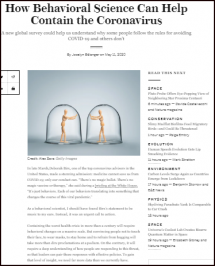How Behavioral Science Can Help Contain the Coronavirus
Very little is known about how factors like fear, misinformation, stress, and social norms are shaping behaviors that affect transmission of COVID-19. Even less is understood about what might lead people to ignore government recommendations altogether.
To fill in these gaps, a consortium of more than 100 behavioral researchers on five continents is currently working around the clock to measure the full social and material consequences of this pandemic. Our goal is simple: to demonstrate in real time what is working—and what isn’t.
The study is designed in three phases. The first consists of a 20-minute-long survey taken weekly that gauges how human beings are coping during this unprecedented crisis. Questions focus on individual thoughts, feelings, concerns and motivations, and how COVID-19 affects everything from faith in leaders to attitudes toward migrants. More than 45,000 people in 100 countries have taken the survey in 22 languages, and the study leaders are registering additional respondents every day.
Last modified: July 21, 2020
Language: English

